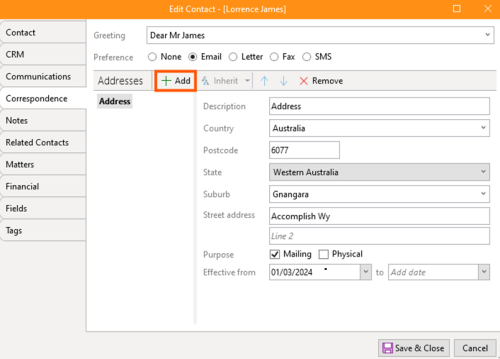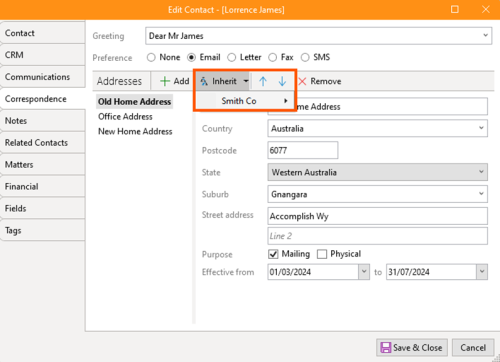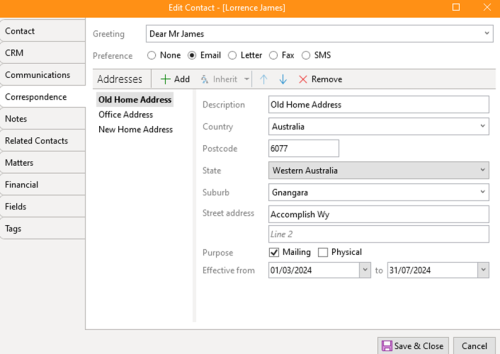Address: Difference between revisions
No edit summary |
No edit summary |
||
| Line 29: | Line 29: | ||
This function extends beyond addresses and is available for phone numbers and email addresses, ensuring seamless integration across communication channels. | This function extends beyond addresses and is available for phone numbers and email addresses, ensuring seamless integration across communication channels. | ||
ContactsLaw in Version 2 captures the addresses of your contacts for the purpose of sending written correspondence, location-based profiling and managing business registration details. In this new version of the application, we've got the ability to add in one address, then have the option to add multiple addresses and we can give them all like custom description. | |||
[[File:Addresses (Add New Address).png|none|thumb|500x500px]] | |||
You may add the postcode since it helpfully goes off and searches all the suburbs associated with that post code to save some double data entry. Then, addresses can be marked as physical, mailing or registered offices. You can also store other addresses (such as property locations) and assign your own labels to addresses. You can select the purpose of the address, so if it's a mailing address and the physical address, or if it's for example just the mailing address like an APO box, you would just select there as mailing. | |||
[[File:Addresses (Enherit).png|none|thumb|500x500px]] | |||
In case that there are new addresses, we can have that being effective from today and that can be his new address. So then hopefully you can see we've got the new address here and the old address is still saved in here, but because it's no longer effective, it won't show up on the summary screen. | |||
With the updated version, we have the option “inherit” which you can inherit an address from a contact that is related to this contact or to credit a company that he's working for. | |||
By storing addresses in component form, ContactsLaw is able to offer maximum flexibility; local addresses can be simplified, domestic or international addresses can be expanded, and addresses can be formatted to span over either multiple lines or a single row. | |||
[[File:Addresses (With Multiple Addresses).png|none|thumb|500x500px]] | |||
Revision as of 10:45, 2 August 2024
ContactsLaw captures the addresses of your contacts for the purpose of sending written correspondence, location-based profiling and managing business registration details.
Types of Addresses
ContactsLaw supports multiple types of addresses, each serving a specific purpose:
- Physical Address: The actual location of a business or individual.
- Mailing Address: Used specifically for sending correspondence.
- Registered Office Address: The official address for business registration purposes.
- Custom Addresses: Addresses with custom labels for specific needs, such as property locations.
Address Data Integration
ContactsLaw comes pre-loaded with data from Australia Post to streamline the process of entering addresses. This feature includes:
- Forward Lookup: Enter a suburb name to retrieve the corresponding postcode.
- Reverse Lookup: Enter a postcode to retrieve the corresponding suburb names.
- Country and State Lists: Choose from a list of predefined countries and states to ensure accuracy and consistency.
Flexible Address Formatting
By storing addresses in component form, ContactsLaw offers maximum flexibility:
- Local and Domestic Addresses: Can be simplified by omitting the name of the state or country.
- International Addresses: Adjusted for clarity and layout preferences.
Inheriting addresses
Address inheritance in ContactsLaw facilitates efficient management by allowing addresses to be inherited from related contacts.
A contact can inherit an address from a related entity. Any updates made to the entity's address automatically update contact's inherited address, maintaining consistency across all relevant records.
This function extends beyond addresses and is available for phone numbers and email addresses, ensuring seamless integration across communication channels.
ContactsLaw in Version 2 captures the addresses of your contacts for the purpose of sending written correspondence, location-based profiling and managing business registration details. In this new version of the application, we've got the ability to add in one address, then have the option to add multiple addresses and we can give them all like custom description.
You may add the postcode since it helpfully goes off and searches all the suburbs associated with that post code to save some double data entry. Then, addresses can be marked as physical, mailing or registered offices. You can also store other addresses (such as property locations) and assign your own labels to addresses. You can select the purpose of the address, so if it's a mailing address and the physical address, or if it's for example just the mailing address like an APO box, you would just select there as mailing.
In case that there are new addresses, we can have that being effective from today and that can be his new address. So then hopefully you can see we've got the new address here and the old address is still saved in here, but because it's no longer effective, it won't show up on the summary screen.
With the updated version, we have the option “inherit” which you can inherit an address from a contact that is related to this contact or to credit a company that he's working for.
By storing addresses in component form, ContactsLaw is able to offer maximum flexibility; local addresses can be simplified, domestic or international addresses can be expanded, and addresses can be formatted to span over either multiple lines or a single row.




